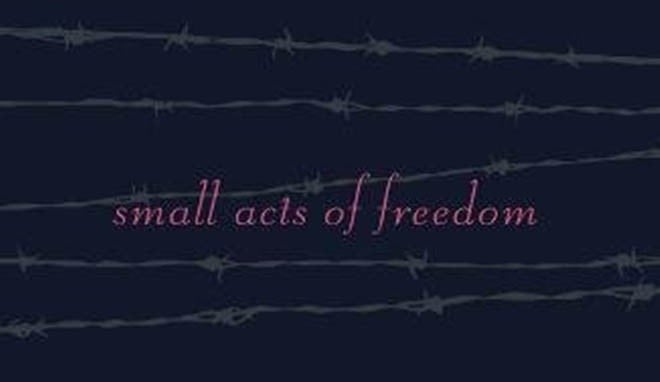
Kaur tells the story of three generations of strong single women in one family, who face the world on their own terms

The problem with Gurmehar Kaur’s Small Acts of Freedom is that it is far too intimate. Although the student and peace activist from Delhi has mixed a mosaic of gut-wrenching memories with the candid account of an intergenerational struggle, readers may find themselves intruding on a family’s private moments of sadness and joy.
Even in her brisk, seemingly incongruous introductory section, Gurmehar Kaur paints the political dimensions of her experiences as a student activist at Delhi University in strictly personal hues. As a result, the author seems to skirt the issues and controversies that propelled her into the spotlight in the first place. It cannot be forgotten that Gurmehar Kaur was catapulted into the public imagination in February 2017, when she decided to participate in a peaceful campaign following clashes at her college premises.
With one Facebook post, Gurmehar Kaur became the fulcrum of an unflagging debate on nationalism in India. The nineteen-year-old activist was vilified for declaring that her father - a martyr who lost his life in the Kargil War - was killed by "war", not the enemy state. Unfortunately, the vitriol, slander and emotional turmoil that plagued this dark, distressing period of her teenage years do not find resonance in Small Acts of Freedom. Gurmehar Kaur’s introduction sets the tone for the sensitive and saccharine moments that dominate the rest of the book.
In this fiercely personal memoir, she shifts the focus from the tumults of her adult life and turns an intimate gaze on the small rebellions, earnest decisions and painful struggles that dictated the lives of her mother and maternal grandmother. But this debut memoir isn’t coloured with the clichéd reminiscences that most authors of dull family histories dredge up without fail. Every anecdote has been chosen with care and woven together as delicate threads of self-awareness, to help the author understand her roots, her family and, more importantly, herself. This book isn’t just an ode to Gurmehar Kaur’s family, but is also a powerful evocation of how small acts by our elders inform our choices and shape our ideological leanings.
However, this approach stands the risk of making readers feel like casual interlopers who are eavesdropping on emotionally charged moments. For instance, the first chapter is set against the backdrop of a personal tragedy. At her father’s funeral, Gurmehar’s grief-stricken family bids adieu to a war hero and praises his valour. The author’s memories of the event are filtered through a string of poignant sentences. She writes: "They lift the dream - covered in the tricolour and dressed with marigolds whose faint smell stays behind on your wrists, fingers and palms - and take it away… All I remember after that are flames. I look for him again. He was right there a few seconds ago and now he is gone".
But even though he is gone, Gurmehar Kaur’s father resurfaces throughout the book as an unfilled void - a person who is kept alive through pictures, memories and stories narrated by her widowed mother. Although the author’s attempts to resurrect her father’s memory are heartrending, they are often repetitive and are seldom based on new epiphanies. These overindulgences don’t seem to have the desired effect and shed the pathos from even the most heart-wrenching moments in the book. This explains why Gurmehar’s letter to her father in the epilogue of Small Acts of Freedom seems to lose its lustre and comes across as a tad stereotypical.
Gurmehar’s debut is undoubtedly a challenging book to write as it straddles the story of three different lives that are set against disparate settings. It is often difficult to recreate a forgotten time in a nuanced manner. But the eras through which the story of her mother and grandmother took shape aren’t etched as vividly in Gurmehar’s memory as they should be. As a result, she struggles to provide context and realistically depict a lost era. Her focus remains on the existential questions surrounding the notion of home and belonging that are much too oblique to drive the narrative towards its logical conclusion. When viewed through this lens, the chapters in Small Acts of Freedom read like a string of disjointed diary entries that are much too personal to offer an honest depiction of how times have changed.
But it would be unjust to expect a young writer, who has been pushed into the limelight by unforeseen circumstances, to achieve so many feats in one masterstroke. If the intentions of the author are anything to go by, Small Acts of Freedom is an attempt to show how her simple life was shattered by a senseless blame game, and how her family prepared her to face "hate bullets" with courage. Recent news reports indicate that Gurmehar Kaur’s second book, which explores her political leanings, will be released next year. We can only hope that the peace activist’s next offering does what Small Acts of Freedom failed to achieve. Until then, we should view Gurmehar Kaur’s debut as a seminal piece that sets the stage for a more politically-driven narrative.
Small Acts of Freedom
Author: Gurmehar Kaur
Publisher: Penguin Books India, 2018
Pages: 234
Price: US$9.34